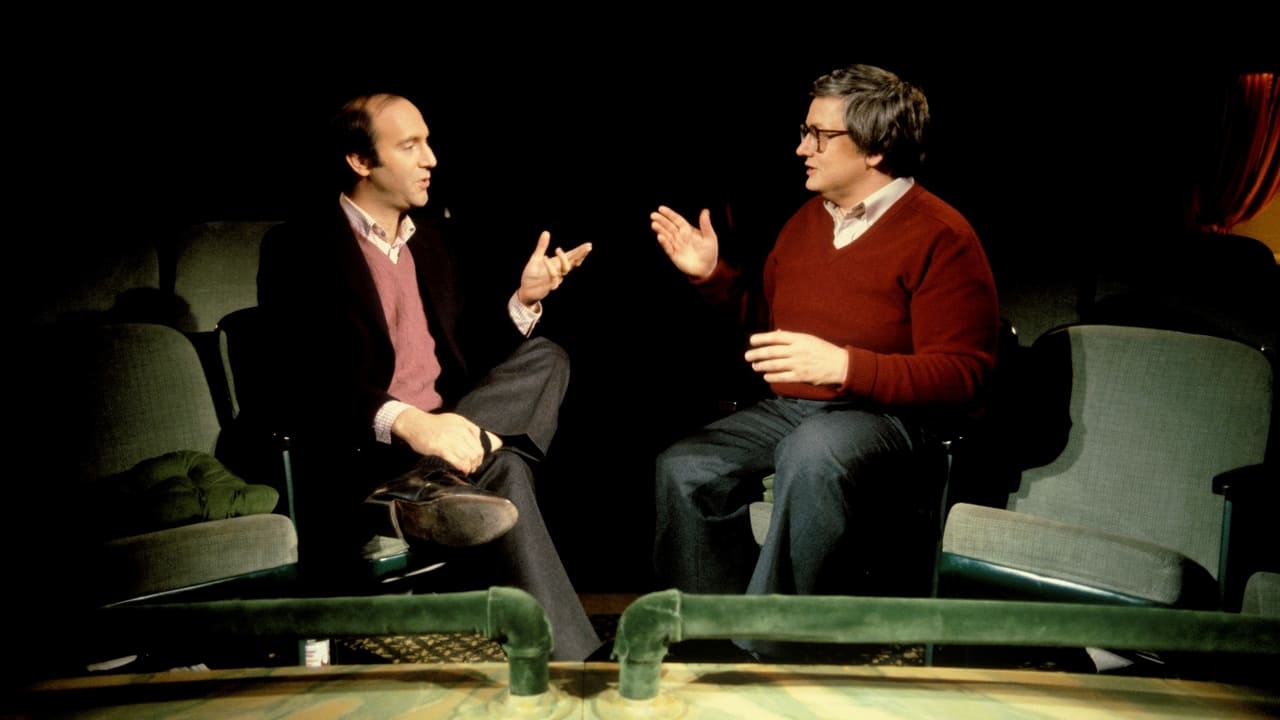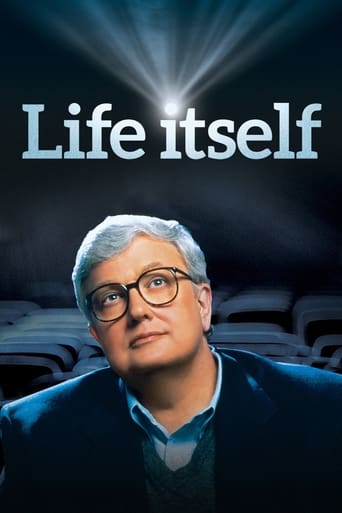Smartorhypo
Highly Overrated But Still Good
Konterr
Brilliant and touching
filippaberry84
I think this is a new genre that they're all sort of working their way through it and haven't got all the kinks worked out yet but it's a genre that works for me.
Robert Joyner
The plot isn't so bad, but the pace of storytelling is too slow which makes people bored. Certain moments are so obvious and unnecessary for the main plot. I would've fast-forwarded those moments if it was an online streaming. The ending looks like implying a sequel, not sure if this movie will get one
Anthony Iessi
In 2013, a bright light went out in the world. Someone who very early on inspired me to not only enjoy watching movies, but to be excited by them. Someone who taught me that nearly anyone could participate in film analysis and pass some amount of judgment (good or bad) about the films I watch. He was Roger Ebert.I loved to see him spar with Richard Roeper in the early 2000's on movies as inconsequential as Death to Smoochy. Clearly, Ebert put his heart on his sleeve when it came to most films and it offended him the most when a film wasted his time. On the other hand, when he adored a film, his praise was simply poetic. He had a way with words, man.. and he knew a good film when he saw one. If Ebert said to go see it, I would usually follow suit. His criticism was astute, meaningful and 9 times out of ten, summed up what he just watched in the most precise way.Life Itself honors him in the way he should've always been honored. Someone far beyond your average, pompous film critic. An average midwestern guy who loves a good flick, but smart enough to have received a Pulitzer Prize. Such a common man's film critic, he might as well have stood on a soapbox outside the theater he attended in Chicago to profess his feelings. Life Itself articulates the anger we all felt when he lost the ability to speak. We see Roger struggle to live any kind of peaceful life, having to constantly go to the hospital for physical therapy. Filmed just a few months prior to his death, it is difficult and angering to watch him suffer. One must wonder, had Roger been able to speak, what would he say? Had his life turned into one of those bad movies he's reviewed in his lifetime?But what will never change from Ebert is his profound affect on the film industry and how fellow filmmakers revered him, even though he may have maligned their films when he felt it was necessary. There's really something to be said about that. Thumbs way, way up.
mpr-90
I was familiar with Roger Ebert from his various review programs and prolific writing, but I knew little about his life and history before watching this film. What a story!His struggles and weaknesses and life-experiences clearly did much to shape his worldview and now, in retrospect, I can see how all those things impacted his writing and reporting on film.This film does a great job of following Mr. Ebert's journey through life and the unflinching way it captures his battle at the end, facing death, was astonishing, painful, and ultimately inspiring.Two thumbs up, indeed!
Dan Franzen (dfranzen70)
Like most movie fans who weren't from Chicago, I was introduced to Roger Ebert through At the Movies, the television show he shared with Gene Siskel, on our local PBS station. Ebert and Siskel were by then already well ingrained in the psyche of the American movie watcher. No longer did we have to rely on the whim of a local newspaper columnist to tell us what may be worth watching. Siskel and Ebert brought life to the movies, and movies to life. Their bickering ran the gamut from the globally sociological to the to the kind of detailed minutia that even the most dedicated cinema nerd would shake his head at. That's what made the show work, and for me it was Ebert's outsized personality that was the true driving force behind it all.Life Itself is based on Ebert's memoirs of the same name, and it's directed by Steve James (Hoop Dreams). A good deal of the movie was shot while Ebert was still alive, although the narration in his voice was provided by a very good impressionist after the fact. James intersperses various biographical scenes with present-day Ebert, riddled with pain but still maintaining a two-thumbs-raised attitude. And, lest he be accused of unabashed hagiography, James makes sure that we see the warts of Ebert's life, through the eyes of people close to him - his wife Chaz, Siskel's wife Marlene, critic Richard Corliss, and producers of the TV show.Even those of us who knew Ebert as "the fat one" on the show knew that there was quite a bit more to the man: his sharp wit, his brilliant prose, and his undeniable zest for all things movies. Truth be told, Roger Ebert was such a talented writer because he was insanely passionate about the movies - what they meant to him personally and what he felt that the average moviegoer would appreciate about them. When you read a review by Ebert, you never really got the feeling that he was issuing an edict from on high, sitting with a quill pen in hand in a small room atop an ivory tower. That was the key to his success. He was writing to you and for you. Roger Ebert was your eyes, your ears, and your voice. Roger Ebert got you.The film journeys from Ebert's upbringing as an only child in a middle-class family to his success running the campus newspaper at the University of Illinois at Urbana-Champaign to his days reviewing countless films for the Chicago Sun-Times (as the youngest full-time movie reviewer at a major-market newspaper) to his days as Siskel's sparring partner through to his days as a progenitor of the use of social media to create original content and foster communication with like-minded movie buffs around the world.Several scenes are of present-day Ebert, and it is these that are the most touching and unnerving. In 2002, he was diagnosed with cancer of the thyroid and salivary glands; unfortunately, infection later set in, and after several further operations, the lower jaw was necessarily removed. James began his documentary after this last procedure, and thus the present-day shots include a jawless Ebert. There are even scenes in which the viewer can clearly see through Ebert's mouth to his sternum.Through all of his medical travails, Ebert continued to work, nurturing a strong online presence, reviewing countless terrible (and great) films, always writing and always from the heart. James, for his part, does a wonderful job capturing not only Ebert's commanding presence (even while infirm) but also his frailities, which Ebert himself owns like a champ. "This is who I am now," he says, particularly in reference to rather unflattering cover photo for Esquire magazine, "take it or leave it." Steve James shows us a flawed Roger Ebert. Ebert is not always right, no matter how loudly he shouts at Gene Siskel. He does not always get his way. He is not always the most likable guy; indeed, in his early years his driving ego was complemented by sheer talent, and eventually the former gave way (mostly) to the latter. Ebert was also a longtime recovering alcoholic and a man who thrived on being the center of attention, a man who desperately wanted to be a part of things and could either play a fool or employ scathing wit to that end.Life Itself is not simply a film about a critic, made for condescending movie fans to fawn over. It is a story about a brilliant, flawed man who wrote passionately about movies and other subjects. It is a movie for fans of humanity.
DinosaurAct86
I went into this film with a profound appreciation for Roger Ebert, both for his words and his philosophies about film, but left it with a sense of reaffirmation.Roger was, of course, a vibrant, opinionated, passionate, and empathetic person, someone who knew when to fight something and when to let something wash over him like a wave. His love for Chaz (and vice versa) and for his family went unmatched, and the film made that love palpable--as it did his love for motion pictures. This is a film that Roger Ebert would have appreciated, were he living now. I also get a sneaking suspicion that although Steve James is at the film's helm, somehow Roger was also there, behind the curtain, editing and rewriting all of the crappy dialogue.But this film is not really about Roger Ebert.Instead, Steve James has gifted us with an honest, untainted look at a human being. We see his faults and strengths, his cruelties and kindnesses, and in the end are left with an incredibly wonderful painting of what it is to be human in the first place. We see what it means to actually love others, to deal with pressures, stresses, and old age. We see what it takes to appreciate life, and then what it takes to leave it. In essence, it is a film bursting with life.Ebert loved the last few paragraphs of The Great Gatsby, in which Fitzgerald talks about the green light, the very essence that fueled Gatsby's grand, yet tragic fate. Ebert knew his light and followed it to the very end; it came from a projector.

